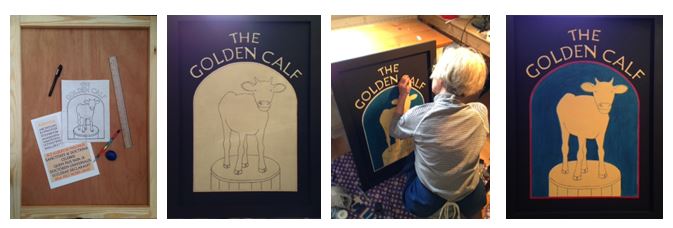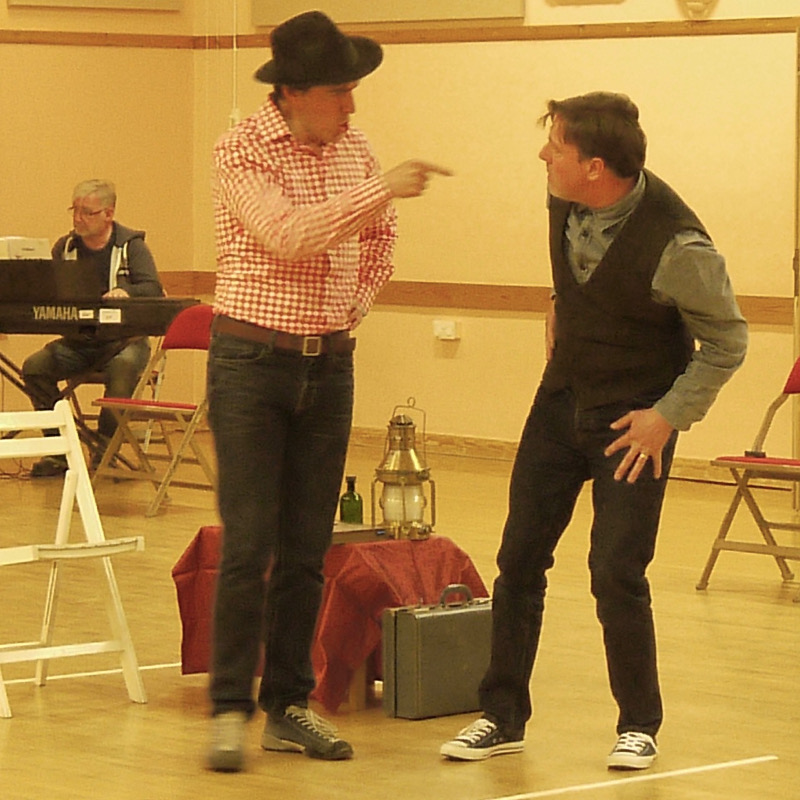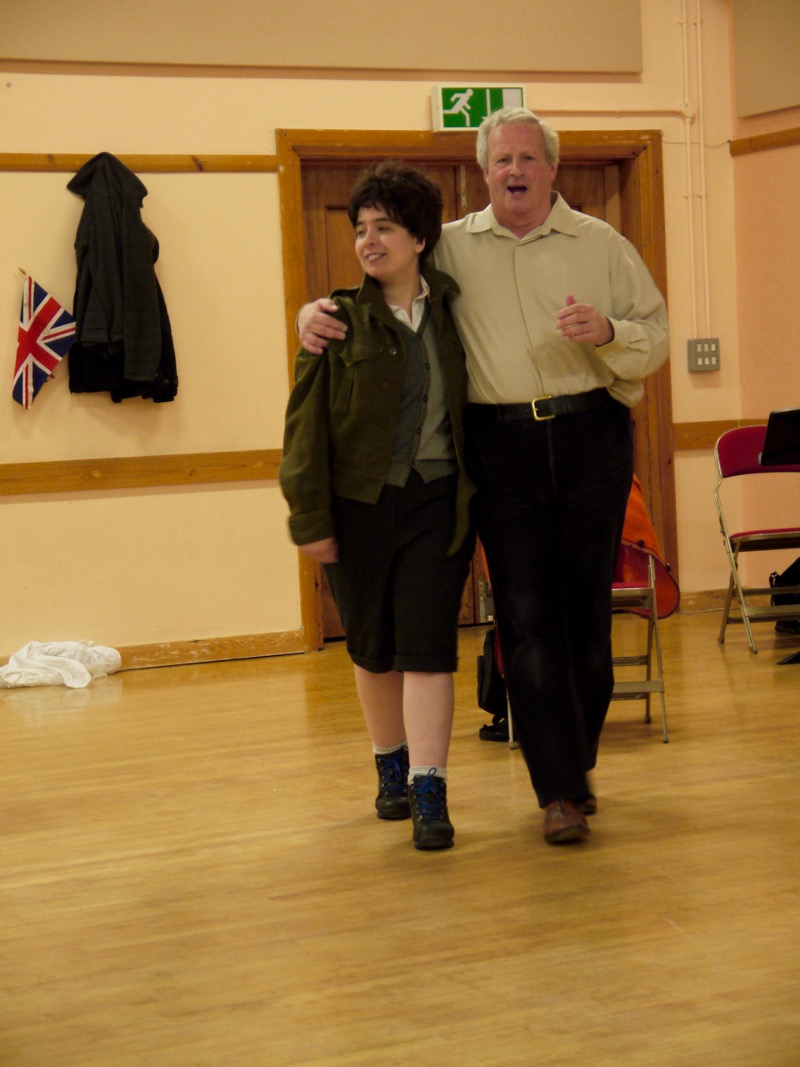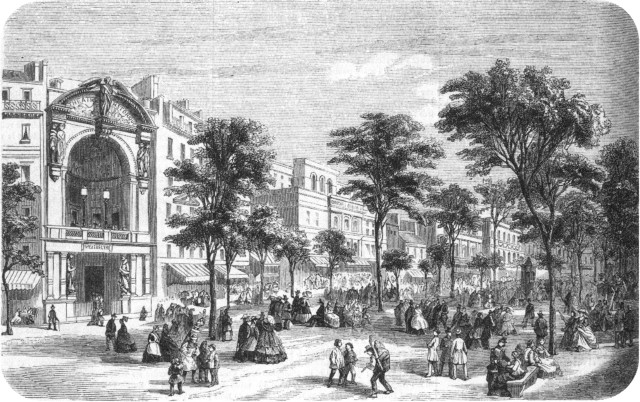
Golden Calf - Ready and Waiting
 |
|
Come and see The Golden Calf - book your tickets for Faust now! |
Paper to Wood
|
This is the fun part, painting my design. I've primed the wood and painted the black areas with enamel. After some colour tests I've decided to use acrylic paints for the rest of the sign - my brief is for it to be gold on black, but I've added some blue and red. Nearly finished! The calf's eyes seem to stare at me as I work. |
 |
Dropping in to Rehearsals

It was all go when I dropped in to last night’s rehearsals for Heber Opera’s production of Faust. The evening carried all of the usual hallmarks – a Director with a critical eye, a Musical Director with a critical ear, a patient pianist, a chorus with pockets full of crib sheets, and principals gamely playing to an invisible audience. Add a smattering of props and costume, and a lighting technician getting the gist of it all, it was all running to plan./p>

I’ve spent the last 20 years working backstage on over 80 shows, and I’ve seen a lot of rehearsals in that time. I always enjoy these last few sessions when show-time is just over the horizon. Though I'm sure for cast at crew it all must seem horribly close to curtain up it should fuel the necessary adrenaline. These run-throughs are the skeleton to the fully fleshed production that the audience gets to see. The Director nips and tucks it all to perfection or as close as possible! With just under a month to go Faust is coming together. Watching I got those shivers of excitement as the story unfolded. You can’t beat the power of the voice and the music, particularly with opera. There is a little more tweaking to go yet, after all the Devil is in the detail!


Faust - The History
We are all gearing up for our first night which is less than 3 weeks! In the meantime we have created this video which looks at the background of the Faust story. We hope you enjoy it.
The performance dates are:
Lines & Letters
|
|
|
To get my angles and lines and curves right I have drawn a more precise sketch on A4 graph paper, which I will enlarge to A1 and use as my guide when working on the wood. Drawing the letters on a curve is challenging - even though I was once a professional calligrapher, I expect the letters to be the hardest part. I've based my lettering on the Albertus font, which was in use in the 1940s when our production of Faust takes place. |
Gounod's "Faust" - The Background
Taking a break from preparing the reduced orchestration for Faust I’ve been giving some thought to the background to the opera.
Charles Gounod had ambitions to compose an opera based on the Faust legend as early as the 1840s but it took a meeting with the well-established opera librettists Jules Barbier and Michel Carré in 1855 to crystallise the idea.

Carré had already written a three-act play based on Goethe’s Faust, called Faust et Marguerite and it was this work that provided the basis for Gounod’s opera.
The opera was commissioned by Léon Carvalho the manager of the Théâtre-Lyrique with the proviso that his wife Caroline Carvalho would sing the role of Marguerite. Gounod finished writing the music in the autumn of 1858 and it immediately went into what turned out to be a very challenging rehearsal period.
The score that Gounod delivered contained far too much music for a normal evening at the opera so the rehearsals involved cutting many of the numbers and rearranging others to different places in the story. In all, about a quarter of the music Gounod wrote had been cut by the first performance. That wasn’t the end of the rehearsal issues; by the early dress rehearsal it had become clear that the tenor allocated to sing Faust wasn’t able to cope with the part and a replacement was brought in with only three weeks’ notice.

In spite of the difficulties in rehearsal, the first run at the Théâtre Lyrique was successful and the work was soon touring in Germany, Italy, Belgium and England. When it was revived in Paris in 1862 it was a hit and, ironically, Gounod had to write extra music so that a ballet could be added as required by the Paris Opéra. The opera remains one of the most frequently performed operas across the globe.
The Faust story is best known from its retelling by Goethe but it is based on an older tales dating back to the fifteenth century.
The models for Faustus might have included Johann Fust, who was also Johann Gutenburg’s business partner, and Johann Georg Faust, an itinerant German alchemist, astrologer and magician, although there are many earlier legends about making a pact with the devil.
The first play based on the Faust legend was probably Christopher Marlow’s Doctor Faustus which was first performed around 1590.
The first opera based on the legend was Faust by Louis Spohr, written in 1816, and the most recent is probably Doctor Atomic by the American composer John Adams, which presents Robert Oppenheimer as a 20th century ‘Faust’. The Faust legend has been used by writers and dramatists as diverse as, Stephen King, Oscar Wilde, Alexander Pushkin, W.S. Gilbert and Terry Pratchett.
To book tickets please click here.
Thinking with Pencil
 |
|
I have drawn my pencil sketch (on A5 paper) for the Golden Calf pub sign. I don't usually make thumbnails or lots of sketches because I generally 'see' a picture in my mind and then put that down on paper. Here are some thoughts that went into my design:
|
Images & Inspirations
Rehearsals are going well for our May production of Faust. Cast and crew not only have music and moves to learn - we also have costumes and props to assemble.

In a leap of faith (as I rarely do any large-scale work as an artist or work on wood) I have volunteered to paint an A1-sized sign for our on-stage pub, The Golden Calf (where the chorus seem to spend a lot of time!) and blog about my progress. I'll get my inspiration from images of cows and pub signs, then let ideas bounce around in my head until I know how I want to proceed with the design.










